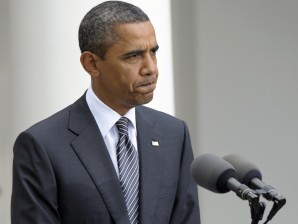Obama imposes new sanctions on Iran
WASHINGTON – US President Barack Obama unveiled new sanctions on Iran’s central bank Monday, tightening an economic choke hold with speculation rampant over a possible Israeli strike on Tehran’s nuclear program.
Obama’s move came as he insists that the tough range of US and European sanctions is exerting “unprecedented” pain on Iran, but with anxiety growing in Israel that the punishments will not halt Tehran’s nuclear drive in time.
“I have determined that additional sanctions are warranted, particularly in light of the deceptive practices of the Central Bank of Iran and other Iranian banks to conceal transactions of sanctioned parties,” Obama wrote in a message to Congress.
The president also decried Iran’s anti-money laundering regime and what he said was the “continuing and unacceptable risk posed to the international financial system by Iran’s activities.”
In an interview with NBC, Obama tried to quell nervousness about the possibility of an Israeli strike on Iran, saying he did not think such a decision, that could trigger a new war in the Middle East, had been taken.
The sanctions, contained in an executive order signed by Obama on Sunday, block all property and interests of the Iranian government, the Central Bank of Iran (CBI) and all Iranian financial institutions within US jurisdiction.
Article continues after this advertisementPreviously, US institutions were required to reject, rather than block, such transactions.
Article continues after this advertisementThe exact dollar figure of assets involved was not immediately clear, but was likely small, with the new sanctions serving as a symbolic sign of US intent towards Tehran after a decades-long feud.
Tough US and EU sanctions make it more difficult for Iran to pay for euro- and dollar-denominated goods, and for it to receive petro-dollars. But Tehran is now increasingly looking to Asia for commerce and trade opportunities.
European sanctions on Iran are expected to have particular impact.
The EU for instance imported some 600,000 barrels per day of Iranian oil in the first 10 months of last year — equivalent to nearly 20 percent of Iran’s exports — making it the key market alongside India and China.
But Europe last month banned all new contracts for Iranian oil.
Obama’s move came amid a torrent of speculation about the possibility of a go-it-alone strike by Israel on underground Iranian nuclear installations it sees as a threat to its existence.
US observers are concerned that a unilateral Israeli attack on Iranian nuclear facilities could trigger a furious response from Tehran, including missile attacks and action by extremist groups allied to the Islamic republic, as well as damaging global economic turmoil after a likely steep hike in oil prices.
There is also anxiety that the United States could get drawn into the conflict to protect its Middle East ally, soon after managing to extricate itself from another damaging war in Iraq.
Obama has refused to take the option of a US military strike on Iran’s nuclear facilities off the table, but there are signs that Washington does not view the threat as imminently as Israel does.
Tehran is not yet believed to have started enriching uranium to weapons grade, a process that would take months before any device was ready to be turned into the deliverable weapon that Washington says it will not tolerate.
Iran denies its nuclear program is intended to build an atomic arsenal.
The Israeli Maariv newspaper on Monday reported that Israeli Prime Minister Benjamin Netanyahu had warned officials to stop “blabbing” about the possibility of an attack.
The measures Obama signed were contained in legislation passed by Congress last year which also required him to impose penalties on foreign financial institutions that do business with the CBI or other Iranian finance firms.
Obama’s action on Monday however does not implement those extra sanctions, designed to bar Iran’s business partners from the lucrative US market. But the Treasury Department warned that firms doing business with Iran “remain at risk” of US punishments.
Senior US officials are currently studying such punishments to find a way to implement them that maximizes pain for Iran, but does not spike oil prices, for instance, in a way that could harm the fragile US recovery.
